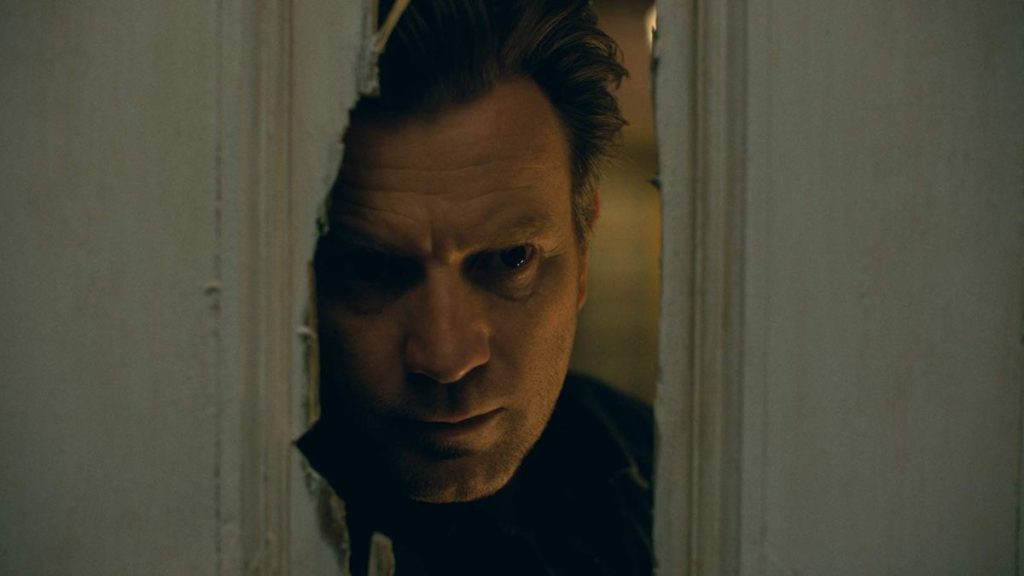It’s well documented that Stephen King did not care for Stanley Kubrick’s vision of his novel The Shining. As someone who loved the film, I assumed that King was being dramatic and didn’t understand why he disliked it so. Upon discovering why, I completely changed my tune. King wasn’t being dramatic at all; he was rightfully upset that his personal story of addiction was disregarded by Kubrick.
Because of this, Mike Flanagan understandably faced the daunting challenge of creating a satisfying adaptation of King’s follow-up novel, Doctor Sleep. So, was Flanagan able to pull it off?
Doctor Sleep follows an adult Dan Torrance (Ewan McGregor) as he tries to escape his demons of addiction and trauma. While working as a hospice orderly, he is befriended by a teenage girl named Abra Stone (Kyliegh Curran) who also possesses The Shining.
As time progresses, she becomes the target of a group of creatures called The True Knot. A group of creatures who feed on children for their “steam” to stay immortal. Mercilessly hunted by their leader Rose the Hat (Rebecca Ferguson), Abra turns to Dan for help to stop them once and for all.
Having seen some of Flanagan’s work such as The Haunting of Hill House, Gerald’s Game and Hush, I was confident that he would make another hit with Doctor Sleep – and he did. Flanagan did an amazing job of bringing the novel to life while putting his own spin on the material.
Whereas IT: Chapter Two should have had some scenes shortened or cut altogether, I felt disappointed that Flanagan didn’t incorporate more of the novel into the film. However, I appreciate that he chose to focus on its essential plot lines, allowing the story to be cohesive and making its runtime fly by.
With Doctor Sleep, Flanagan once again showcases why he’s a fantastic horror director. He not only induces fright throughout the film, he also adds intense brutality – something new for him – in certain sequences that will etch them into your brain long after the movie ends. One in particular involving a child left me utterly terrified. He also does a fantastic job with cinematography. His close-ups truly capture the characters’ emotions while the usage of unique angles make you feel as if you’re in the film.
Even though the screenplay’s source was King’s novel, Flanagan managed to flesh out a couple of the characters a bit more than King did, most notably Abra. For being a thirteen year old girl, she spoke like a child a lot in the novel when she was afraid, calling her parents “Mommy” and “Daddy” and pronouncing certain words the way a toddler would.
In the film, Flanagan wrote her as headstrong and extremely mature for her age, making her compelling to her novel counterpart. The opposite could be said about Dan, however. He was the best character in the novel due to how well King fleshed him out, but Flanagan somewhat changed his persona to that of a meek man for a large chunk of the film.
Whether it was Mike Flanagan or Ewan McGregor who decided to portray Dan that way, McGregor delivered a great performance as usual. McGregor said he accepted the role due to his struggles with alcohol addiction in the past, and there were a few scenes that rang true to his words. It felt as if McGregor were channeling his own demons rather than Dan’s.
In addition to McGregor, Rebecca Ferguson was superb as Rose the Hat. She was so menacing that it absolutely scared me at times. Of course, I’d be remiss if I didn’t mention Kyliegh Curran’s wonderful performance as Abra. She fabulously balanced a childlike nature and tenacious personality.
Unfortunately, the film becomes a bit disjointed in the third act. What is meant as Flanagan paying homage to Kubrick quickly wears out its welcome, turning instead into a recreation of The Shining for the most part.
Thankfully, Flanagan remedies that by ending the film on a satisfying, yet gut-wrenching note. Although Doctor Sleep is The Shining‘s follow-up, I can’t call the film a sequel to Kubrick’s work because it feels like its own stand-alone film. It is, however, a faithful, worthy adaptation of the novel.

